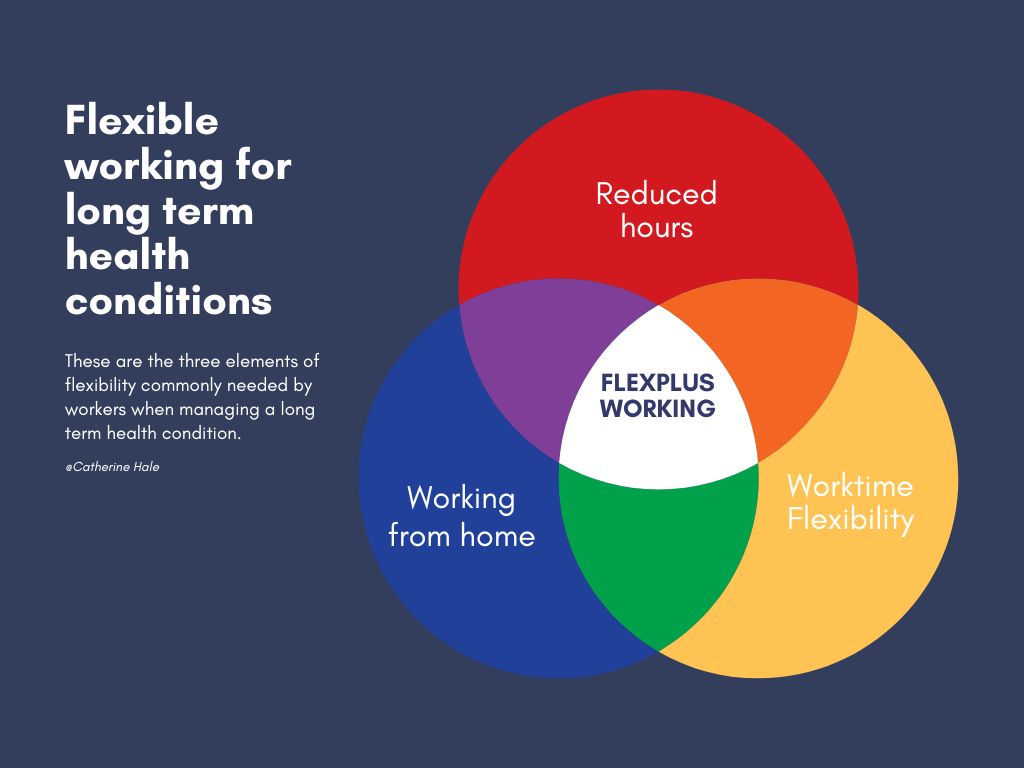King’s College London are currently conducting research into how flexible job design might help people with fluctuating disabilities who are seeking work. Catherine Hale, key research team member and Astriid Ambassador, has recently shared an article on their early findings and introduced the term FlexPlus job roles to our vocabulary. Here’s what we know so far…
Why do we need FlexPlus job roles?
Previous research by Astriid into the working arrangements of people with long-term health conditions shows that people with Energy Limiting Conditions typically need three dimensions of flexibility in combination:
- Worktime flexibility so that people can spread out their working hours across the week(s), in order to accommodate fluctuating symptoms and a variable capacity for work.
- Reduced hours to accommodate the needs of people with energy impairment, those who use pacing to manage their symptoms, and/or those following specific medical or treatment regimes.
- Working from home to remove the exertion of travel and being in over-stimulating work environments, giving people increased autonomy to manage their medical needs.
Therefore, FlexPlus jobs are roles that involve more than one dimension of flexibility and go further than common understandings of flexible working.

What barriers are preventing FlexPlus roles from being created?
The researchers are currently investigating the organisational barriers that prevent employers from creating FlexPlus job roles. The barriers identified so far include:
- Following changes to the law back in April, many businesses seem to be redrawing their flexible working policies to prescribe which kinds of flexible working are “reasonable” and which are not.
- Employers may be willing to carve out a FlexPlus role for an existing employee, but disabled people seeking to enter and re-enter the jobs market are almost entirely excluded from these opportunities.
- Negotiating reduced hours during the hiring process is typically seen as problematic or unwelcome by employers. This poses a barrier for jobseekers who can (and want) to work but need significantly reduced working hours.
What happens next?
Of the employers interviewed as participants, none of them felt confident that their organisation would currently be able to offer FlexPlus jobs to disabled jobseekers. They specified the need for research evidence, case studies and toolkits to enable them to embed FlexPlus ways of working within job design in the future.
This finding reflects Astriid’s long-standing belief that employers have much to gain from becoming more informed about long-term conditions and energy limiting conditions in the workplace.
What do you think? Would you like to see FlexPlus jobs become more readily available? Join in the conversation on social media!
‘Can flexible job design improve employment outcomes for people with fluctuating disabilities?’ is an ongoing research study by Catherine Hale, Professor Ben Geiger, Professor Kim Hoque, Professor Ira Madan and Roberta Kirosingh. Find out more on the King’s College London website!
~
Here at Astriid, we are experts by experience in long-term conditions at work. If you’re an employer or organisation looking to diversify your talent pool, head to this page to find out how we can support you!
